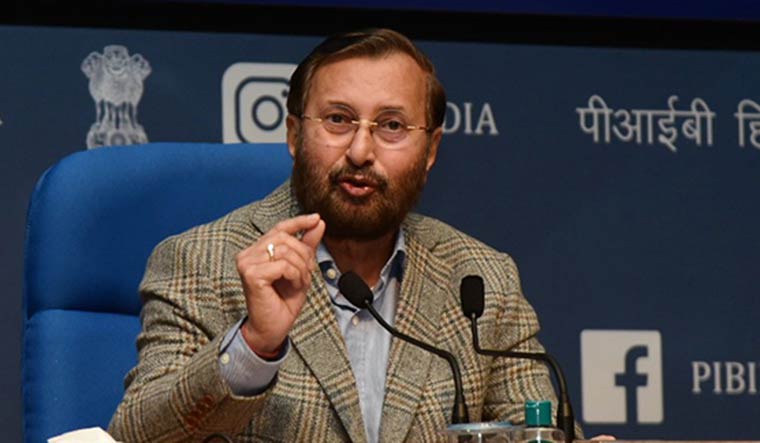India has finally begun its strike back at Big Tech with a rather powerful dose of Big Brother-like measures, compiled under the Information Technology (Guidelines for Intermediaries and Digital Media Ethics Code) Rules, 2021.
Yet with these draft rules, the government seems to have aimed for low-hanging fruit by pinning the responsibility for social media posts onto social media platforms and lording over OTT platforms by playing morality police. In the process, it side-steps questions on digital news, in particular the issue of revenue sharing by tech biggies like Google and Facebook, one that is being discussed across the world right now.
The rules announced by IT minister Ravi Shankar Prasad (symbolically joined on stage by Information & Broadcasting Minister Prakash Javadekar at the government's announcement on Thursday afternoon) could fundamentally alter the present cantankerous nature of not just social media as we know it, but the very dissemination of independent news online.
“A section of the draft rules also deal with the regulation of online media, which as per the definitions in the rules will include digital news media and video streaming platforms. The earlier set of rules placed for public consultation made no mention of these provisions," points out Kazim Rizvi, founder of the tech policy think-tank The Dialogue. “It is a matter of concern as the language used in the definition is broad, vague and may have overarching implications.”
Make no mistake, in the guise of “stopping abuse of social media”, the government (or frightfully, file-pushing bureaucrats at the joint secretary level) seems bent on ensuring every netizen thinks twice before putting up a piece of their mind in text, or even through the sharing of links, online. And that some control could be exerted on the many independent online news media outlets in operation. Naturally, concerns have popped up over the need for this—Were the Press Council Act, Cable Television Regulation Act and even the many existing provisions of the IT Act so insufficient?
While stepping on the clutch to have better control over social media was a foregone conclusion, especially considering the recent skirmish the establishment had with Twitter, what has come as more of a surprise has been the haste with which the government has pushed in provisions to control the likes of online news media as well as of OTT streaming services. This overreach could well hit content creation and the many startups in this genre.
"There have been expectations from the Government to regulate OTT platforms, especially those that disseminate video content, (though) there was an absence of clarity in terms of the form of such regulation. As the public awaited (the rules announced today) also covered the aspect of content and such platforms, much to the surprise of experts,” points out Kazim Rizvi, founder of the tech policy think-tank The Dialogue.
This, even as OTT players discussed with the government on Wednesday offering to set up a self-regulatory mechanism, even while requesting that any new legislation be discussed with them first. It was only in November that a cabinet secretariat notification moved films, audio-visual programmes, news and current affairs available online from the ambit of the IT ministry to that of the Information and Broadcasting (I&B) ministry.
ALSO READ: 'It was good while it lasted': What new OTT rules could mean for India's internet
To be fair, the new laws for social media were on the anvil since 2018, when the draft Intermediary Liability Guidelines was put up for discussion amongst civil society, privacy experts, big tech and the public. However, that time, the focus was on social media platforms and their ‘abuse’, though technology and behaviour changed a lot—data analytics, the influence of social media in changing public opinion and even elections and current affairs, and the spawning of new modes of entertainment like OTT popped up.
The pandemic catalysed digital adoption, with social media and news sites becoming the primary source of news, and the likes of YouTube and Netflix becoming numero uno when it came to entertainment.
There is also the question of implementation, with suggestions of bureaucratic decision making, always a recipe for a botch-up. Explains Prof. (Dr.) Nigam Niggehalli, dean of BML Munjal University: “The real issue, which we will have to wait and watch, is to see how the rules are implemented and whether more bureaucratic supervision will lead to more stifling of freedom of expression. One more issue with the rules is that the grievance redressal and oversight mechanism for social media intermediaries must be thought through properly.”
Naturally, the players have gone into a huddle, trying to make sense of it. In a terse statement, Facebook India spokesperson said the company will study the new rules carefully, even while it said it was “committed to people’s ability to freely and safely express themselves on our platforms.”
Big Brother surely wanted a leg up into this free-for-all. The rising power and influence of social media and Big Tech, their apparent disdain for governments (the confrontation between Facebook and the Australian government last week is a classic case in point) meant governments had to make clear who the big daddy of them all is.
This is rather akin to another legislation in the offing, which proposes to ban cryptocurrency, where the establishment tries to ensure fintech and blockchain and the like do not infringe on its sovereign right over monetary and currency control.





